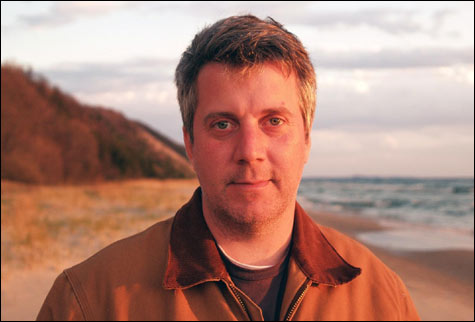
CLOSE SHAVE: Werewolves, yes, but Barlow’s verse is more literary than pop. |
| Sharp Teeth | by Toby Barlow | Harper Collins | 324 pages | $22.95 |
Here’s what you need to know about Toby Barlow’s debut novel, Sharp Teeth: (1) It’s about packs of werewolves roaming modern-day Los Angeles; (2) It’s written in unrhymed verse; (3) The story, the emotion, and the beauty and precision of Barlow’s language can convince you that new writers who want to experiment are not all zombies risen from the Iowa Writers’ Workshop to suck the life out of American fiction. To judge from Barlow’s author photo, he even shaves regularly.Sharp Teeth provides the combination of smarts, lyricism, and thrills that you might associate with the brainiest horror and fantasy entertainments. If you loved Buffy the Vampire Slayer, you’ll probably love Sharp Teeth. But it’s not a pop novel. Barlow doesn’t kid the premise — his humor is of a drier sort. There’s suspense and narrative momentum, but the story, even at its most violent, isn’t visceral. Barlow takes a mournful, sage tone. The poet’s voice telling us the story is speaking, as storytellers almost always do, about matters that are settled, events that can’t be changed.
For all that it has the elements of a thriller plot, with competing wolfpacks (used, among other things, by big-time meth dealers to take out their small-time competition) and shifting loyalties, Barlow has written a novel about the connections — familial, social, romantic — we form, about how easily they break, and about the comfort to be found in the compromises we never thought we’d settle for. A schlocky horror novel would set us up for slaughter when Lark, the leader of one pack and one of Barlow’s two protagonists, is adopted by a lonely woman. (Werewolves here look like dogs when they change over.) But Lark finds that he loves the affection she gives him, and that he can take pleasure in the affection he gives her.
The parallel to that is the story between the other protagonist, the sweet, kindhearted dogcatcher Anthony, and the unnamed female of Lark’s pack who, sent to seduce Anthony, instead falls for him. This is another tale of adoption, only in this one it’s the wolf who adopts the human.
The book has to do with the intersections of these characters, how Lark goes about rebuilding his pack when a betrayal decimates it, and it carries you along. But what matters more is the way Barlow uses the story of Anthony and his wolf woman to talk about how love brings us only so far, about the longings and differences it can’t erase, about the way Lark’s travels show how the search for the ephemeral something more gnaws at us even amid the most profound contentment.
The beauty of Sharp Teeth’s language depends on passages too long to quote, on the way the poetry arises from the seeming plainness of the language (in a take-off on Homeric epics, it opens, “Let’s sing about the man there/at the breakfast table”), on how a sudden shading at the end of what’s been a purely narrative stanza can inject a sliver of cruelty or sadness or solace.
To attempt any novel, let alone a first novel, let alone one with a fantastical premise, in verse could have invited disaster, or it could have invited the kind of showboating that would have made story and character and emotion subservient to language. Just as Toby Barlow’s characters are two creatures in one body, he’s poet and novelist. And like them, he makes a seamless transition from one to the other.